Résultats de recherche de titre
Articles 1491201 à 1491220 sur 1501854
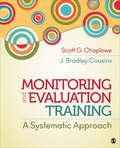
Monitoring and Evaluation Training: A Systematic Approach
Par J. Bradley Cousins, Scott G. Chaplowe. 2016
This one-of-a-kind book fills a gap in the literature by providing readers with a systematic approach to monitoring and evaluation…
(M&E) training for programs and projects. Bridging theoretical concepts with practical, how-to knowledge, authors Scott Chaplowe and J. Bradley Cousins draw upon the scholarly literature, applied resources, and over 50 years of combined experience to provide expert guidance that can be tailored to different M&E training needs and contexts, including those for novices, professionals, organizations and their staff, community members, and other groups with a desire to learn and sustain sound M&E practices.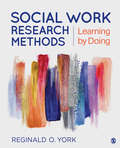
Social Work Research Methods: Learning by Doing
Par Reginald O. York. 2020
Social Work Research Methods is a step-by-step journey through the process of conducting research. With over 30 years of teaching…
experience, author Reginald O. York helps readers discover how research can enable them to better serve clients in the field. Each chapter features a hands-on approach to producing research, with practical chapter exercises that reinforce methods mastery. Using their own data, students engage in realistic research activities and gain an appreciation for science-informed practice as a means of evaluating client outcomes.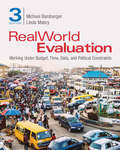
RealWorld Evaluation: Working Under Budget, Time, Data, and Political Constraints
Par Linda S. Mabry, J. Michael Bamberger. 2020
RealWorld Evaluation: Working Under Budget, Time, Data, and Political Constraints addresses the challenges of conducting program evaluations in real-world contexts…
where evaluators and their clients face budget and time constraints. The book is organized around the authors’ seven-step model that has been tested in workshops and practice environments to help the evaluation implementers and managers make the best choices when faced with real world constraints. The Third Edition includes a new chapter on gender equality and women’s empowerment and discussion of digital technology and data science.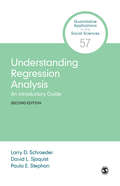
Understanding Regression Analysis: An Introductory Guide (Quantitative Applications in the Social Sciences #57)
Par Larry D. Schroeder, David L. Sjoquist, Paula E. Stephan. 2017
Understanding Regression Analysis: An Introductory Guide presents the fundamentals of regression analysis, from its meaning to uses, in a concise,…
easy-to-read, and non-technical style. It illustrates how regression coefficients are estimated, interpreted, and used in a variety of settings within the social sciences, business, law, and public policy. Packed with applied examples and using few equations, the book walks readers through elementary material using a verbal, intuitive interpretation of regression coefficients, associated statistics, and hypothesis tests. The Second Edition features updated examples and new references to modern software output.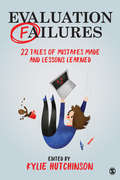
Evaluation Failures: 22 Tales of Mistakes Made and Lessons Learned
Par Kylie Hutchinson. 2019
"This is the evaluation book we′ve been waiting for! A must-read for all learning and working in the field." –Amanda…
M. Olejarski, West Chester University Evaluation Failures: 22 Tales of Mistakes Made and Lessons Learned is a candid collection of stories from seasoned evaluators from a variety of sectors sharing professional mistakes they have made in the past, and what they learned moving forward. As the only book of its kind, editor Kylie Hutchinson has collected a series of engaging, real-life examples that are both entertaining and informative. Each story offers universal lessons as takeaways, and discussion questions for reflective practice. The book is the perfect companion to anyone working in the evaluation field, and to instructors of program evaluation courses who want to bring the real world into their classroom.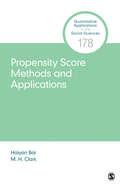
Propensity Score Methods and Applications (Quantitative Applications in the Social Sciences #178)
Par Haiyan Bai, M. H. Clark. 2019
A concise, introductory text, Propensity Score Methods and Applications describes propensity score methods (PSM) and how they are used to…
balance the distributions of observed covariates between treatment conditions as a means to reduce selection bias. This new QASS title specifically focuses on the procedures of implementing PSM for research in social sciences, instead of merely demonstrating the effectiveness of the method. Using succinct and approachable language to introduce the basic concepts of PSM, authors Haiyan Bai and M. H. Clark present basic concepts, assumptions, procedures, available software packages, and step-by-step examples for implementing PSM using real-world data, with exercises at the end of each chapter allowing readers to replicate examples on their own.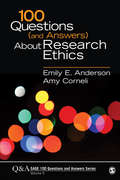
100 Questions (SAGE 100 Questions and Answers #5)
Par Emily E. Anderson, Amy L. Corneli. 2018
100 Questions (and Answers) About Research Ethics is an essential guide for graduate students and researchers in the social and…
behavioral sciences. It identifies ethical issues that individuals must consider when planning research studies as well as provides guidance on how to address ethical issues that might arise during research implementation. Questions such as assessing risks, to protecting privacy and vulnerable populations, obtaining informed consent, using technology including social media, negotiating the IRB process, and handling data ethically are covered. Acting as a resource for students developing their thesis and dissertation proposals and for junior faculty designing research, this book reflects the latest U.S. federal research regulations to take effect mostly in January 2018.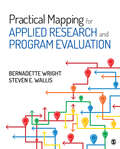
Practical Mapping for Applied Research and Program Evaluation
Par Bernadette M. Wright, Steven E. Wallis. 2020
Practical Mapping for Applied Research and Program Evaluation is the first book to bring the mapping methodology to social research…
and program evaluation. Bernadette Wright and Steven E. Wallis guide readers through all phases of the research process: learning from stakeholder experience; reviewing existing knowledge in the field; conducting new data collection such as interviews; collaborating with other researchers; and facilitating the use of knowledge for communication, collaboration, and action. With plenty of illustrations and navigational aids such as "travel tips," the book is an accessible guide for busy students, researchers, and managers of all levels of experience.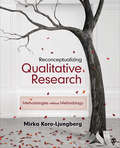
Reconceptualizing Qualitative Research: Methodologies without Methodology
Par Mirka Koro. 2016
Calling for qualitative research that is complex, situational, theoretically situated, and yet productive, Reconceptualizing Qualitative Research discusses the multiplicities and…
uncertainty embedded in different methodological configurations and entanglements that blur the boundaries between doing research, theorizing, thinking, and reflecting. Writing in a clear, conversational style, author Mirka Koro-Ljungberg urges readers to think about qualitative research differently, often in creative ways, and to continuously question existing grand narratives and dogmas.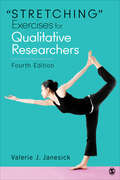
"Stretching" Exercises for Qualitative Researchers
Par Valerie J. Janesick. 2016
In the new Fourth Edition of her inventive, one-of-a-kind book, author Valerie J. Janesick uses dance, yoga, and meditation metaphors…
to help researchers tap into the intuitive and creative side of their research. In every chapter, "stretching" exercises help readers develop, practice, and hone fieldwork skills and vital habits of mind such as observation, interviewing, writing, creativity, technology, and analysis. While reading the book and working through the exercises, readers can complete a researcher’s reflective journal—an invaluable tool that will remain useful throughout their careers.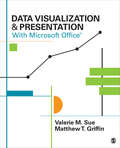
Data Visualization & Presentation With Microsoft Office
Par Valerie M. Sue, Matthew T. Griffin. 2016
Written for students, professionals, and social scientists with little or no knowledge of data visualization principles, this complete guide presents…
step-by-step instructions for clearly and effectively presenting data using MS Office programs. Throughout the book, the focus is on turning raw, quantitative data into attractive, well-designed charts and tables that tell an accurate narrative about underlying information. Helpful illustrations, expert tips for solving common issues, and discussions on working efficiently are included to equip readers with the tools they need to engage their audience using a visual format.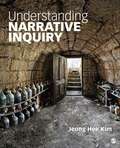
Understanding Narrative Inquiry: The Crafting and Analysis of Stories as Research
Par Jeong-Hee Kim. 2016
This comprehensive, thought-provoking introduction to narrative inquiry in the social and human sciences guides readers through the entire narrative inquiry…
process—from locating narrative inquiry in the interdisciplinary context, through the philosophical and theoretical underpinnings, to narrative research design, data collection (excavating stories), data analysis and interpretation, and theorizing narrative meaning. Six extracts from exemplary studies, together with questions for discussion, are provided to show how to put theory into practice. Rich in stories from the author′s own research endeavors and incorporating chapter-opening vignettes that illustrate a graduate student′s research dilemma, the book not only accompanies readers through the complex process of narrative inquiry with ample examples, but also helps raise their consciousness about what it means to be a qualitative researcher and a narrative inquirer in particular. This book has received the 2017 Outstanding Publication Award from the Narrative Research Special Interest Group (SIG) of the American Educational Research Association (AERA). The award honors research-based texts dedicated to advancing the educational process through research or scholarly inquiry.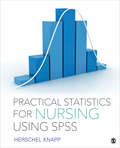
A friendly and approachable guide to real-world statistics, Practical Statistics for Nursing Using SPSS® covers the most common statistical functions…
in nursing science using plain language. Students learn by doing, and an emphasis on this practical approach is seen throughout the book with each chapter structured to answer key questions: What statistical test should I use for this situation? How do I set up the data? How do I run the test? How do I interpret and document the results? Practice exercises include a vignette, codebook, and data sets ready for processing, enabling students to achieve mastery by carrying out actual statistical analyses. Online resources for students are available and include data sets for examples and exercises, fully developed solutions to all odd-numbered exercises, and thorough tutorial videos providing an overview of each statistical method, step-by-step guidance on SPSS® processing, and interpretation of results. Online resources for instructors include Microsoft® PowerPoint® slides for each chapter and solutions to all exercises.
Reconceptualizing Qualitative Research: Methodologies without Methodology
Par Mirka Koro. 2016
Calling for qualitative research that is complex, situational, theoretically situated, and yet productive, Reconceptualizing Qualitative Research discusses the multiplicities and…
uncertainty embedded in different methodological configurations and entanglements that blur the boundaries between doing research, theorizing, thinking, and reflecting. Writing in a clear, conversational style, author Mirka Koro-Ljungberg urges readers to think about qualitative research differently, often in creative ways, and to continuously question existing grand narratives and dogmas.
Global Studies Research
Par Pamela A. Zeiser. 2020
Global Studies Research is a research methods textbook designed for interdisciplinary International Studies majors and their faculty. The textbook introduces interdisciplinarity,…
provides basic building blocks of relevant disciplinary knowledge, explains a process for integrating knowledge from multiple disciplines, and models this interdisciplinary International Studies Research Process in its presentation of the case studies.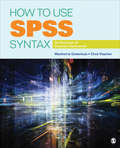
How to Use SPSS Syntax: An Overview of Common Commands
Par Chris Visscher, Manfred Te Grotenhuis. 2014
Rather than focusing on SPSS menus and the graphic user interface, How to Use SPSS Syntax focuses on the syntax…
rules in SPSS, a more encompassing approach that allows readers to replicate statistical analyses by storing them in a file for future use. Practical, accessible, and highly focused, the book is brief, while still helping readers develop an in-depth understanding of the common syntax rules and commands. In every chapter, the authors clearly explain the syntax, show the main results, and include social science research examples and downloadable files that allow readers to follow along. Checks throughout the book help readers determine whether the syntax is used correctly.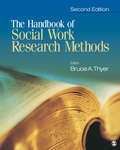
The Handbook of Social Work Research Methods
Par Bruce A. Thyer. 2010
Click on the Supplements tab above for further details on the different versions of SPSS programs.The canonical Handbook is completely…
updated with more student-friendly features The Handbook of Social Work Research Methods is a cutting-edge volume that covers all the major topics that are relevant for Social Work Research methods. Edited by Bruce Thyer and containing contributions by leading authorities, this Handbook covers both qualitative and quantitative approaches as well as a section that delves into more general issues such as evidence based practice, ethics, gender, ethnicity, International Issues, integrating both approaches, and applying for grants. New to this EditionMore content on qualitative methods and mixed methods More coverage of evidence-based practice More support to help students effectively use the Internet A companion Website containing a test bank and PowerPoint slides for instructors and relevant SAGE journal articles for students. This Handbook serves as a primary text in the methods courses in MSW programs and doctoral level programs. It can also be used as a reference and research design tool for anyone doing scholarly research in social work or human services.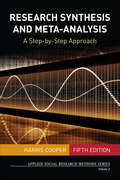
The Fifth Edition of Harris Cooper′s bestselling text offers practical advice on how to conduct a synthesis of research in…
the social, behavioral, and health sciences. The book is written in plain language with four running examples drawn from psychology, education, and health science. With ample coverage of literature searching and the technical aspects of meta-analysis, this one-of-a-kind book applies the basic principles of sound data gathering to the task of producing a comprehensive assessment of existing research.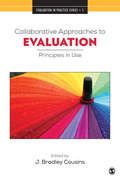
Collaborative Approaches to Evaluation: Principles in Use (Evaluation in Practice Series #3)
Par J. Bradley Cousins. 2020
Editor J. Bradley Cousins and colleagues meet the needs of evaluators seeking to implement collaborative and participatory approaches to evaluation…
in Collaborative Approaches to Evaluation: Principles in Use. Using a multi-phase empirical process to develop and validate a set of principles to guide collaborative approaches to evaluation, the book outlines the principles that the team developed, and then provides case studies of how these principles have been applied in practice. The case studies draw on programs globally in education, health, and community development. The book is an invaluable supplementary text for program evaluation courses where students’ projects are focused on more collaborative and participatory approaches, and it is an essential resource for practicing evaluators and those who commission program evaluations.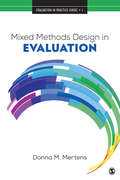
Mixed Methods Design in Evaluation (Evaluation in Practice Series #1)
Par Donna M. Mertens. 2018
In this groundbreaking first volume of SAGE′s Evaluation in Practice Series, best-selling author Donna M. Mertens explores the meaning of…
mixed methods evaluation, its evolution over the last few decades, and the dominant philosophical frameworks that are influencing thought and practice in the field today. Four chapters explore evaluation of the effectiveness of interventions, development of instruments, systematic reviews, and policy evaluations, while an additional chapter covers evaluation approaches often required in specific contexts including gender responsive evaluations, needs assessment, and evaluations in conflict zones. Practical in nature, the book guides readers’ thinking about the design of mixed methods evaluations through the use of illustrative examples and explanations for further applications. SAGE’s Evaluation in Practice Series offers concise, practical books for students and professionals working as evaluators.